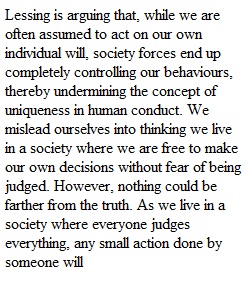


Q 1. Lessing writes that people in democratic societies tend to believe they are free to make their own choices and the worst restriction on them is possibly not having enough money to do what they wish. She calls this a “flattering” picture and a misconception. What does she mean? 2. Lessing says "We (the human race) are now in possession of a great deal of hard information about ourselves, but we do not use it to improve our lives.” Why not? Can or will this ever change? 3. Both Lessing and Asch would agree that rebelling against a group of one's peers is extremely difficult. What are some examples in society you can think of when rebellion against a group of one’s peers is appropriate and necessary?
View Related Questions